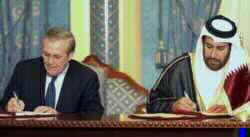The United States signed a pact on Wednesday to upgrade military bases in Qatar that it could use in any conflict with Baghdad, as U.N. arms inspectors searched six suspect weapons sites in Iraq. The World Bank said a U.S. military attack on Iraq in the coming months could send crude oil prices soaring over DLRS. 40 a barrel. But it added that prices could plummet below DLRS. 20 after a conflict as more oil supplies hit the market.
Brent oil futures stood around DLRS. 26.30 on Wednesday. But many traders were holding off from doing business ahead of Thursday's OPEC meeting in Vienna which will decide future output policy for Middle East-dominated cartel of oil exporters.
Secretary of Defense Donald Rumsfeld and Qatari Foreign Minister Sheikh Hamad bin Jassim bin Jabr al-Thani signed the agreement to upgrade Qatar's bases at a ceremony in Doha.
Rumsfeld said the pact, under discussion for some time, would improve military readiness.
"This agreement is not connected to Iraq. It has been under discussion for a long time. It would be a mistake to connect it to Iraq," he said.
But Qatar and other Gulf states such as Bahrain and Kuwait would be key to any U.S. attack on Iraq.
The U.N. arms inspectors based in Baghdad continued their search, a day after Washington threatened possible nuclear retaliation if its forces or its allies were attacked with weapons of mass destruction.
IRAQ SUBMITS MASSIVE DOSSIER
Iraq denies possessing such weapons and submitted a 12,000-page dossier on its weapons programs to the United Nations last Saturday.
The distribution of the document has angered smaller, non-permanent Security Council members who are to receive only an edited copy. Syria, a key Middle East player bordering Iraq, and other smaller nations are complaining of being treated as second-class powers.
The United States had got unanimous support in November for a tough Security Council resolution threatening Iraq with "serious consequences" if it failed to cooperate with the U.N. arms experts returning after a four-year gap.
The experts, in their third week after returning to Baghdad, have intensified their inspections since the dossier was handed over.
Hiro Ueki, spokesman for the inspectors, said teams had visited six sites on Wednesday and had completed a two-day check on a uranium extraction plant near the Syrian border.
One team went to a factory for missile and tank parts at Karamah complex just north of Baghdad.
The factory was built in 1999, after inspectors left the country, but Iraq said nothing illegal was being done there.
"The whole site is under monitoring but the factory itself was searched for the first time," said its director, Brigadier Kamel Saeed. "It was on the declaration handed in by Iraq."
Ueki said in a statement that Iraq had included the site in a declaration it submitted on October 1, weeks before handing over the much bigger dossier last weekend.
MISSILE PARTS
The plant is part of a complex run by the Karamah Public Company, part of Iraq's Military Industrialization Commission.
"We make precision parts for al-Somoud missiles," Saeed said. The 60-foot rocket has a maximum range of 95 miles, which is permitted under the 1991 Gulf War cease-fire terms.
A previous facility at the site was bombed in late 1998, Saeed said. The experts inspected machines previously tagged by arms teams at the destroyed facility.
"They checked and found everything is okay. There were no provocations but questions, and we answered them," Saeed added.
Journalists, who toured the sprawling site after inspectors left, saw workers in blue and gray overalls using computerized lathes to make metal parts for missiles, tanks and other gear.
Saeed said the inspectors had watched the work, checked the computer programs and asked for maps of the site.
Ueki said U.N. experts had checked five other locations: Ibn Sina, a former uranium enrichment plant north of Baghdad, along with the nearby Amil liquid nitrogen plant; the Tuweitha nuclear site south of Baghdad; a biological site at Amriyah west of the capital; and armaments facilities west of Baghdad
PHOTO CAPTION
U.S. Secretary of Defense Donald Rumsfeld (L) and Qatari Foreign Minister Sheikh Hamad bin Jassim bin Jabr al-Thani sign a pact to upgrade Qatari military bases in Doha, December 11, 2002, taking the U.S. presence here a step closer to permanence and providing the Americans bases for use in any conflict with Iraq.. REUTERS/Qassim Rahmatullah
- Dec 11 1:17 AM ET
- Author:
& News Agencies - Section:
WORLD HEADLINES


 Home
Home Discover Islam
Discover Islam Quran Recitations
Quran Recitations Lectures
Lectures
 Fatwa
Fatwa Articles
Articles Fiqh
Fiqh E-Books
E-Books Boys & Girls
Boys & Girls  Hajj Rulings
Hajj Rulings Hajj Fatwas
Hajj Fatwas














